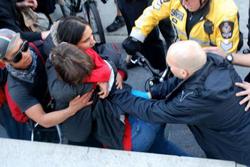Did police use excessive force at the G8 University Summit protest? A social worker's story.
Thomas Posyniak and Linda Solomon
A lone bus lumbered forward and attempted to gain access into the Fairmont Waterfront Hotel in downtown Vancouver last Friday afternoon. In it were several dozen dignitaries attending the Group of 8 industrialized nations education summit. On this day, however, some eighty people stood between the bus and its destination. Among those eighty was Stan Stansilov.
After failing to gain entry to the hotel itself, Stansilov and a number of fellow protestors moved themselves in position to impede the bus. Their stated intention, according to Stansilov, was “non-violent disobedience”. The protestor’s march down Burrard Street had been shadowed by the Vancouver Police Department, and soon a growing number of officers – some in uniform, some in plain clothes – moved in to meet this impediment.

According to Stansilov, there was no warning from the VPD, no order to vacate the area. “There was no sort of pushing or shoving at the police…They did the first shove. There was no forewarning,” Whether or not there was a warning, the police response was sudden and concerted. A wave of blue descended on the protestors, shoves and shouts their main tools of crowd control. A miniature chaos enveloped the situation for several minutes as the police cleared a path for the bus. Eventually, the way cleared, the bus escaped the protestors.
While the bus carrying the protestor’s target made an exit from the scene, the story was far from over for Stansilov. Returning to acquire his bike (which, he alleges, was damaged in the initial scuffle), Stansilov witnessed a close friend being arrested. His friend’s mother, also present, rushed forward in possible attempt to prevent this. Stansilov, now quite frustrated and angry with the VPD, attempted to gain a better vantage point to bear witness to this arrest. While an officer warned him not to come closer, Stansilov ventured closer anyway. “I just went through one of the gaps [between the officers] and walked through calmly and suddenly I was being taken down by four or five cops.”
Stansilov, at a quite substantial 6 foot 2”, says his size was a factor in his treatment thereafter. An officer pushed his head so that his chin went into his chest. Looking back on the incident, Stansilov maintains that the level of force applied by the police was beyond anything experienced during previous rallies. He explains this as resulting from the Olympic spotlight. “It seemed like there was a bit more motivation to hold back some during the Olympics…but this was a lot more excessive than what I saw then,” he speculated.
The police, he contended further, were seemingly enjoying their task of crowd control, perhaps a result of holding back during the Olympics.
After being restrained, Stansilov says he was beginning to cooperate with the authorities. Eventually, he was picked up, put in a paddywagon, and sent off to the police station on Main and Cordova.
His time in jail was seemingly meant for him to ‘cool-off’, since, in the end, no charges were filed against him by the VPD. In any case, Stansilov had time to reflect on the what happened that day, both personally and politically.
Stansilov, educated at McGill University in social work, now practices his choice of studies. His profession is on the frontline of many of the most pressing grassroots social issues in Vancouver, that is, poverty, housing, homelessness and employment. In his view, education, or more accurately, publically funded and administered education, is one possible catchall tool to address the origins of these issues. Publically funded and accessible higher-level education then would avail broad sections of society the opportunities currently available mainly to the middle and upper income brackets.
With this perspective in mind, Stansilov saw the G8 Education Summit as an international arm of an effort by universities and governments to privatize universities. “It [the summit] was organized to talk about applying the business model to universities and education. How do we turn this into a wealth generating institution?” Seeing public and accessible education as they lynch pin of a more equitable society, a university system reformed on market principles was anthemia to Stansilov. In his mind, he had to do something. The “non-violent disobedience” was that something.
While this passive resistance did not ultimately stop the bus or the summit for long, Stansilov believes it sent a message. Aside from the momentary delay, he believes the delegates and their colleagues may stop and re-think their course of action in light of the protest.
Speaking more broadly, Stansilov took solace that their actions raised awareness merely from the police reaction. In his opinion, the reaction was police brutality, and reflected a state fixation on maintaining the status quo. In this sense, he placed his and the other protestor’s struggle for public education and social equity as just another example among many throughout the last few decades. It was this motivation that propelled him onto Burrard Street to step in front of a bus and its police escort.
The VPD, as mentioned, made arrests, but opted not to charge anyone that day. The department acknowledges that this attempt had to be physically dispersed by some sixty officers. They ask that any specific allegations of excessive force be entered into the proper complaint channels.
Source: http://www.vancouverobserver.com/politics/2010/05/26/did-police-use-excessive-force-g8-university-summit-protest-social-workers-story



